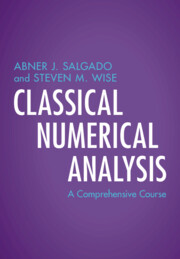Book contents
- Frontmatter
- Contents
- Preface
- Acknowledgements
- Symbols
- Part I Numerical Linear Algebra
- Part II Constructive Approximation Theory
- Part III Nonlinear Equations and Optimization
- Part IV Initial Value Problems for Ordinary Differential Equations
- Part V Boundary and Initial Boundary Value Problems
- 23 Boundary and Initial Boundary Value Problems for Partial Differential Equations
- 24 Finite Difference Methods for Elliptic Problems
- 25 Finite Element Methods for Elliptic Problems
- 26 Spectral and Pseudo-Spectral Methods for Periodic Elliptic Equations
- 27 Collocation Methods for Elliptic Equations
- 28 Finite Difference Methods for Parabolic Problems
- 29 Finite Difference Methods for Hyperbolic Problems
- Appendix A Linear Algebra Review
- Appendix B Basic Analysis Review
- Appendix C Banach Fixed Point Theorem
- Appendix D A (Petting) Zoo of Function Spaces
- References
- Index
28 - Finite Difference Methods for Parabolic Problems
from Part V - Boundary and Initial Boundary Value Problems
Published online by Cambridge University Press: 29 September 2022
- Frontmatter
- Contents
- Preface
- Acknowledgements
- Symbols
- Part I Numerical Linear Algebra
- Part II Constructive Approximation Theory
- Part III Nonlinear Equations and Optimization
- Part IV Initial Value Problems for Ordinary Differential Equations
- Part V Boundary and Initial Boundary Value Problems
- 23 Boundary and Initial Boundary Value Problems for Partial Differential Equations
- 24 Finite Difference Methods for Elliptic Problems
- 25 Finite Element Methods for Elliptic Problems
- 26 Spectral and Pseudo-Spectral Methods for Periodic Elliptic Equations
- 27 Collocation Methods for Elliptic Equations
- 28 Finite Difference Methods for Parabolic Problems
- 29 Finite Difference Methods for Hyperbolic Problems
- Appendix A Linear Algebra Review
- Appendix B Basic Analysis Review
- Appendix C Banach Fixed Point Theorem
- Appendix D A (Petting) Zoo of Function Spaces
- References
- Index
Summary
In this chapter we study finite difference schemes for parabolic partial differential equations. The notions of conditional and unconditional stability, and CFL condition are introduced to analyze the classical schemes for the heat equation. Different techniques, like maximum principles and energy arguments are presented to obtain stability in different norms. Then, we turn to the study of the pure initial value problem, the grand goal being to discuss the von Neumann stability analysis. To accomplish this we introduce the notions of Fourier-Z transform of grid functions and the symbol of a finite difference scheme. This allows us to state the von Neumann stability condition and prove that it is necessary and sufficient for stability. These notions are also used to present a covergence analysis that is somewhat different than the one presented in previous sections.
Keywords
- Type
- Chapter
- Information
- Classical Numerical AnalysisA Comprehensive Course, pp. 774 - 810Publisher: Cambridge University PressPrint publication year: 2022

